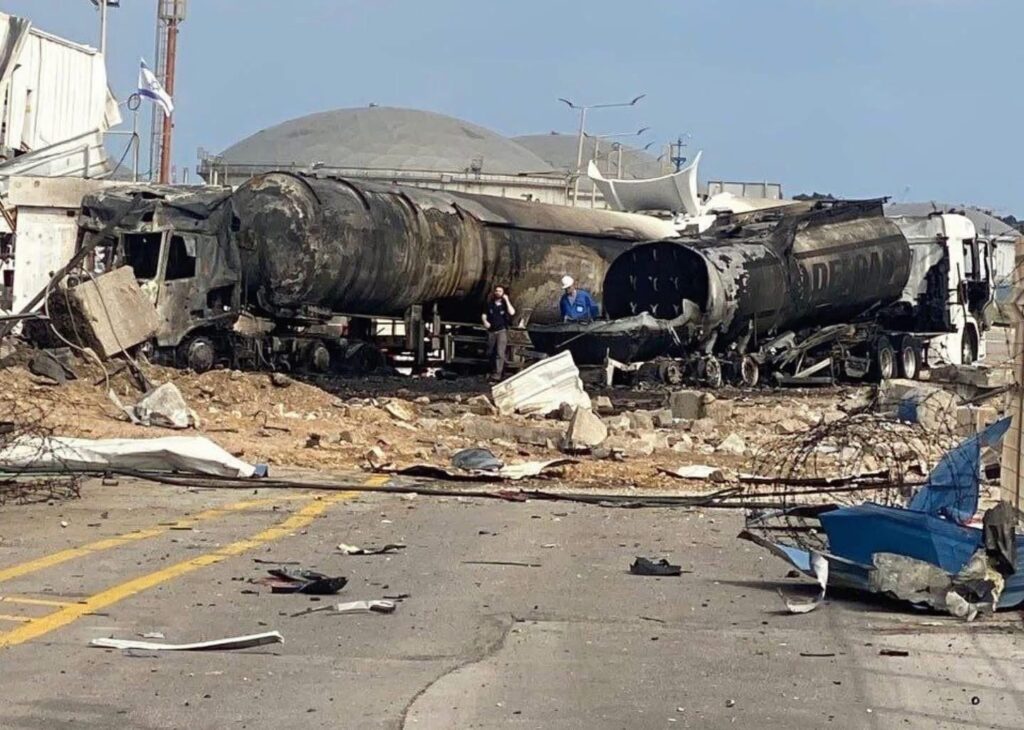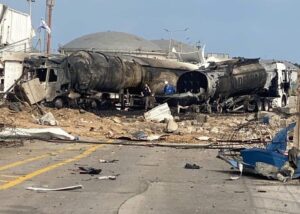Israel-Iran Conflict Intensifies: Sixth Day of Escalating Strikes with Iran targeted Haifa Oil Refinery & Power Plant

June 18, 2025 – The conflict between Israel and Iran, now in its sixth day, has reached unprecedented levels of intensity, with both nations exchanging devastating missile and airstrike barrages. The violence, sparked by Israel’s “Operation Rising Lion” on June 13, 2025, aimed at crippling Iran’s nuclear and military capabilities, has killed hundreds, displaced thousands, and raised fears of a broader regional war. Below is a detailed update on the latest developments based on available sources.
Key Developments
Military Escalation
- Israeli Operations: Israel’s air campaign, launched on June 13, targeted over 150 sites, including Iran’s Natanz nuclear enrichment facility, where approximately 15,000 centrifuges were likely destroyed, dealing a severe blow to Iran’s nuclear program. Additional strikes hit the Iranian Ministry of Defense, Quds Force command centers, and energy infrastructure, including Tehran’s Shahran fuel depot and a southern oil refinery. On June 16, an Israeli airstrike hit Iran’s state broadcaster (IRINN) during a live broadcast, killing two staff members, Nima Rajabpour and Masoumeh Azimi, with Israel claiming the site was a military communications hub.
- Iranian Retaliation: Iran has launched nine waves of missile and drone attacks under “Operation True Promise III,” with the latest on June 17 targeting Tel Aviv, Haifa, and Jerusalem. Iran deployed its advanced Haj Qassem ballistic missile, which evaded Israel’s Iron Dome and other defenses, causing significant damage in Haifa, including a direct hit on Israel’s largest oil refinery. A strike in Tamra, northern Israel, killed four women, and another in Petah Tikva killed three.
- Casualties and Damage: Iran reports 224 deaths, with 90% civilians, including 60 in a single strike on a Tehran apartment block, and 1,277 injuries. Israel confirms 24 civilian deaths and nearly 600 injuries from Iranian strikes, with significant damage to residential and industrial areas, including Haifa’s port infrastructure and Tel Aviv’s suburbs. In Tehran, fuel shortages and power outages have triggered civilian unrest.
U.S. Involvement and Diplomacy
- U.S. Support for Israel: The U.S. has bolstered Israel’s defense, with American naval forces intercepting Iranian missiles. President Donald Trump, who cut short his G7 summit attendance, demanded Iran’s “unconditional surrender” on June 17 but vetoed an Israeli plan to assassinate Supreme Leader Ayatollah Ali Khamenei. Trump suggested Iran missed a chance for de-escalation via nuclear talks, which Iran canceled after Israel’s strikes.
- Nuclear Talks Collapse: Scheduled U.S.-Iran nuclear negotiations in Oman were scrapped, with Iran citing ongoing Israeli attacks. Iran’s Foreign Minister Abbas Araghchi demanded a ceasefire, calling Israel’s actions “barbarous” and accusing the U.S. of complicity.
International Reactions
- Global Condemnation and Calls for Restraint: The UN, China, and the EU condemned the escalation, with Russia calling Israel’s strikes on nuclear sites “illegal” and warning of a potential “nuclear catastrophe.” G7 leaders, including French President Emmanuel Macron, urged de-escalation, but Trump rejected ceasefire talks. The UAE waived overstay fines for stranded Iranians due to airspace closures.
- Oil Market Impact: Brent crude surged to $76.37 per barrel, with fears of disruptions in the Strait of Hormuz, a critical oil route. Iran’s partial suspension of production at the South Pars gas field after an Israeli strike has heightened economic concerns.
Strategic Context
- Israel’s Objectives: Prime Minister Benjamin Netanyahu stated the strikes aim to eliminate Iran’s nuclear and ballistic missile programs, claiming they set back Iran’s nuclear capabilities “by years.” He suggested regime change could result, noting Iran’s government is “very weak.”
- Iran’s Position: Iran insists its nuclear program is peaceful, with President Masoud Pezeshkian asserting its right to nuclear energy. Supreme Leader Khamenei vowed a “strong response” to Israel’s “terrorist” actions. Iran’s advanced missile capabilities, including the Haj Qassem, have challenged Israel’s defenses, but analysts note Iran must ration these weapons.
- Nuclear Threat: The International Atomic Energy Agency (IAEA) reported in May 2025 that Iran had 409 kg of 60% enriched uranium, close to weapons-grade, raising Israel’s concerns. Israel’s strikes avoided operational reactors like Bushehr to prevent nuclear accidents, but damaged centrifuges at Natanz could release low-level radiation.
Current Situation
- Ongoing Strikes: As of June 18, both sides continue to exchange missile volleys, with Israel claiming aerial superiority over Tehran and Iran preparing its “largest and most intense” missile attack yet. Air raid sirens persist across Israel, and Tehran residents face worsening shortages.
- Civilian Impact: Nearly 3,000 Iranians have been evacuated from Tehran, with 24 buildings slated for demolition in Israel. Iran’s strikes have tested Israel’s Iron Dome, with some missiles penetrating defenses, a new challenge for a population accustomed to threats from weaker groups like Hamas.
- Diplomatic Stalemate: No ceasefire is in sight, with Israel rejecting international calls for restraint and Iran refusing negotiations under attack. Mediation efforts via Oman, Qatar, and Saudi Arabia have yielded no concrete proposals.
Analysis and Outlook
The conflict’s escalation, driven by Israel’s preemptive strikes and Iran’s robust retaliation, risks drawing in regional actors or disrupting global energy supplies. Iran’s threats to close the Strait of Hormuz could spike oil prices further, while Israel’s targeting of nuclear and military leadership aims to force Iran into negotiations or collapse its regime. However, Iran’s missile stockpile and advanced weaponry suggest it can sustain attacks for weeks, challenging Israel’s defenses and economy. The U.S.’s defensive support for Israel, without direct offensive involvement, limits the risk of a wider war but complicates diplomacy.





